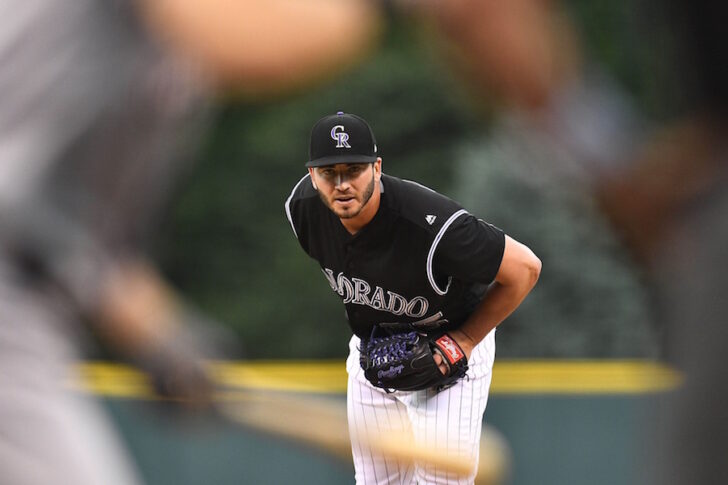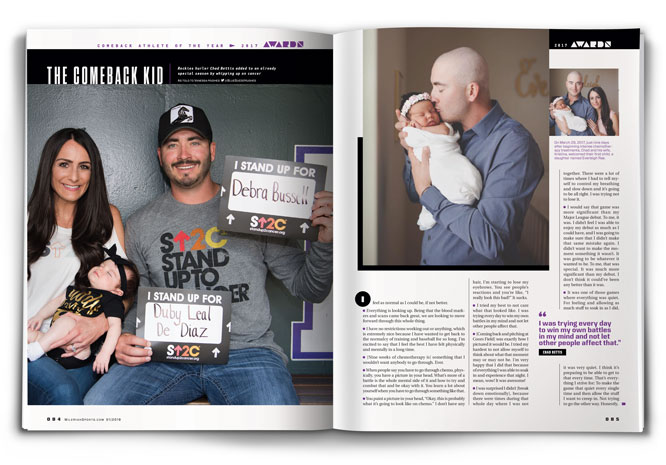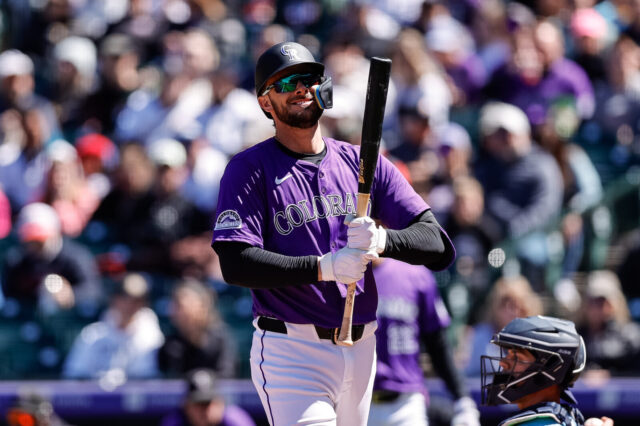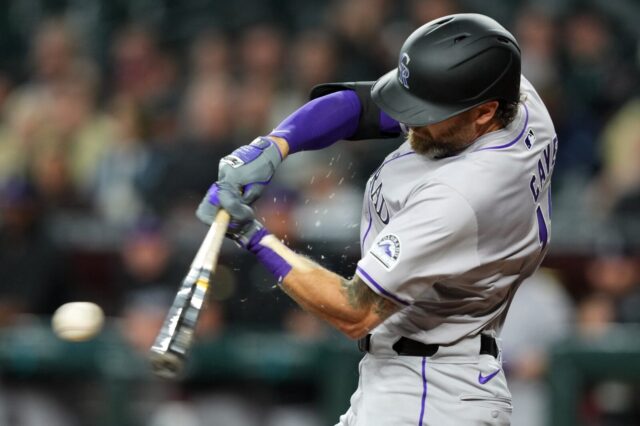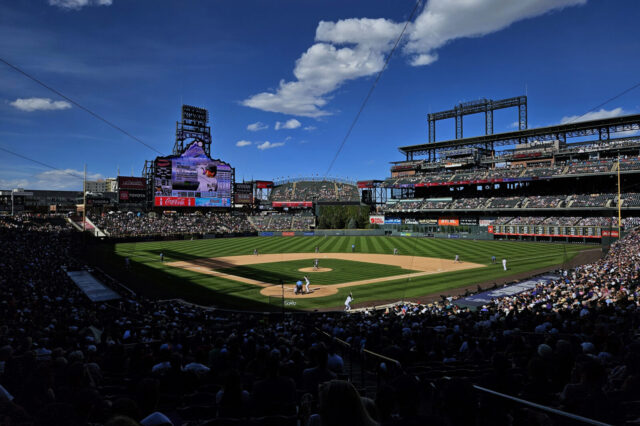This story originally appeared in Mile High Sports Magazine. Read the full digital edition.
The Comeback Kid
Rockies hurler Chad Bettis added to an already special season by whipping up on cancer
Each month Mile High Sports Magazine sits down with an important figure in Colorado sports. For January, Vanessa Hughes spoke with Rockies starter and cancer survivor Chad Bettis, the Mile High Sports 2017 Comeback Athlete of the Year.
***
Vanessa Hughes: First and foremost, how are you doing and feeling?
Chad Bettis: Everything is great. I feel like it’s back to normal life here. I don’t think I can ever say that I’ll ever feel that way again, but I feel as normal as I could be, if not better.
You recently had a doctor appointment and everything came back clean. Great news! So, what’s the latest with your health, check-ups and what do things look like moving forward, at least for the near future?
The appointment was just a regular checkup [compared to] having gone through chemotherapy. Everything is looking up. Being that the blood markers and scans came back great, we are looking to move forward through this whole thing. I haven’t quite figured out when my next scans would be, but I’m looking forward to that day.
Let’s go back to last March when you learned you’d have to go through chemotherapy. Nine weeks of chemo began March 20. Describe what it was like for you.
It’s something that I wouldn’t want anybody to go through. Ever. It’s not as easy as people make it out to be. The one thing that I learned is that everybody responds differently to the chemo and what those side effects are. When people say you have to go through chemo, physically, you have a picture in your head. What’s more of a battle is the whole mental side of it and how to try and combat that and be okay with it. You learn a lot about yourself when you have to go through something like that.
You paint a picture in your head, “Okay, this is probably what it’s going to look like on chemo.” I don’t have any hair, I’m starting to lose my eyebrows. You see people’s reactions and you’re like, “I really look this bad?” It sucks.
I tried my best to not care what that looked like. I was trying every day to win my own battles in my mind and not let other people affect that. You’re trying to win your own thoughts. That’s all that matters at that point. I think if you get to where you allow other people to influence that negatively, then it’s going to be a lot harder fight than what it could be.
Your final chemo treatment was May 16. Less than three months later, you returned to pitch at Coors Field on August 14 against Atlanta. Rockies fans welcomed you back with a loud ovation. Describe how you felt and what it was like when you stepped on the field that night.
[Coming back and pitching at Coors Field] was exactly how I pictured it would be. I tried my hardest to not allow myself to think about what that moment may or may not be. I’m very happy that I did that because of everything I was able to soak in and experience that night. I mean, wow! It was awesome!It’s amazing that you were able to keep it together and not break down.
I was surprised I didn’t, because there were times during that whole day where I was not together. There were a lot of times where I had to tell myself to control my breathing and slow down and it’s going to be alright. I was trying not to lose it.
I would say that game was more significant than my Major League debut. To me, it was. I didn’t feel I was able to enjoy my debut as much as I could have and I was going to make sure that I didn’t make that same mistake again. I didn’t want to make the moment something it wasn’t. It was going to be whatever it wanted to be. To me, that was special. It was much more significant than my debut. I don’t think it could’ve been any better than it was.
Your return was unbelievable, really. Seven scoreless innings, no walks, two strikeouts and the Rockies won. How the heck did you keep your emotions under control?
I don’t know. It was one of those games where everything was quiet. For feeling and allowing as much stuff to soak in as I did, it was very quiet. I think it’s preparing to be able to get to that every time. That’s everything I strive for — to make the game that quiet every single time and then allow the stuff I want to creep in. Not trying to go the other way. Honestly, I think it’s a little easier when games mean that much more. I feel like it helps you focus a little bit more.
On the day you came back to pitch for the Rockies, you tweeted: “Not a day goes by that I don’t think about the many people who were positively affecting me.” Can you point to one or two messages you received, and from whom, that really impacted you?
Throughout the sports world. [Jon] Lester, [Anthony] Rizzo, (Cubs teammates and fellow cancer survivors), some of the players from the Dodgers, Kike [Hernandez], and [Joc] Pederson, just saying, “Hey, we’re praying for you; we’re there for you,” and I think that just shows how tight-knit our [baseball] fraternity is.
One of the more significant messages I received when the news first came out was from my longtime childhood friend, Austin Taylor, who sent me a text message that said I was way too damn competitive to let something like this beat me. It was something I needed to hear when I needed to hear it the most.
Were you surprised by the response you got throughout Major League Baseball and the sports world overall?
Yeah. Wow. It was unbelievable for everyone essentially saying that they were going to be there if I needed anything. The fact that they meant it in such a sincere way, I think that’s what was more touching.
There are many athletes that have gone through various types of cancer treatments. Is there anybody you’ve leaned on that has been helpful for you throughout this process?
When I first got diagnosed, Lance Armstrong actually reached out to me. We talked about what to expect and what it may or may not look like. He was in the same boat as everybody else that had messaged me, saying that if I needed anything to let him know. His exact words were that he “would be at my disposal,” which was kind of funny because I was like, “How do I respond to that? Wow.” He taught me a lot about what to expect, but at the same time, what he went through. It was cool.
Was there ever a time throughout chemo or at any other point before you came back, that you thought you would never be able to play baseball again?
Not coming back and playing was never in question.
It’s been a huge roller-coaster ride for you and your family over the past year. What do you ultimately point to that got you through it all?
A lot of support, and my faith and my family. I can’t list everybody that helped me get to where I was at on August 14.
I think one of the things I looked forward to was watching us play. It was kind of an escape, but at the same time, it was a way for me to somewhat stay involved with the guys.
And it seemed like they really wanted you there and made a concerted effort to include you. That was important for both you and for your Rockies family, wasn’t it?
Probably more for me than for them. What all of those guys did for not just me, but my family. They know, and I know and my family knows. I think everybody that needs to know knows. It goes without saying. My family and I will forever be grateful.
Your daughter, Everleigh Rae, was born March 29, nine days after you started chemo. [Your wife] Kristina planned to be induced that day, which was her due date, but she actually went into labor naturally. You slept on the couch in Kristina’s hospital room for two nights waiting for Everleigh’s arrival. What was it like to be there when she was born?
I wouldn’t have missed it for anything. I’m very thankful that I was able to feel as good as I did while going through everything — to be able to be there to support my wife. I feel like everyone tells you the first time you see her, you’re going to feel a love that you’ve never thought you could feel before. I was like, “I already love her. How could it be any better?” And then you see her. And then you hear her cry. And then the doctor lets you know that everything is okay. It’s an overwhelming amount of very good emotions. I cried a little bit. What a blessing.
Everleigh is about 9 months old now. What is she like and how has she grown and changed?
Everleigh is growing in all aspects. She’s huge, eating solids now. She’s eating like a champ, crawling around more so than ever and she’s started to try to stand up on her own and climb on stuff. She hasn’t started walking yet. We’re trying to get there but it’s awesome. I think one of the biggest kicks is seeing her facial expressions when we switch foods up on her and it’s her first time eating it. She likes sweet potatoes, peas and green beans, [and] carrots, but she doesn’t like fruits right now, which is really funny.
What does your typical day look like during the offseason?
Wake up about 6 a.m., hang out, feed Everleigh and if she decides she wants to go back to bed, then put her to sleep and wake back up around 8. If she wants to stay up, we get some breakfast and coffee and then we go on a little family walk, then put her down for a nap. Then, Kristina and I just be bums until she wakes back up and then grab lunch at some point. Really it’s just a lot of doing nothing which is nice and relaxing. We may or may not swim, and then it’s dinner time. And then it’s bedtime. I feel like this is the first time I really get to commit a lot of time [to Everleigh].
On November 21, 2016, you and Kristina returned to the Sanctuary Resort and Spa in Scottsdale, where you were married, to celebrate your first wedding anniversary. During that anniversary dinner, you received a phone call from your urologist confirming that you had cancer. Incredibly difficult news to hear, yet Kristina did her best to shift the focus from cancer to celebrating your marriage — at least for that night. She has been a rock and has provided incredible support and encouragement to you through all of this. You two recently celebrated two years of marriage. What did you do to honor your special day?
We did end up at the Sanctuary for our second anniversary and luckily there were no big surprises (laughs). What we have is special and we want to celebrate it each year. We were told from some of our good friends to never stop dating, so we kinda took that literally.
What are your plans for the holidays? What traditions would you like to start this year now that Everleigh is part of your family and this will be her first Christmas?
We are planning to go up to Michigan to see [Kristina’s] parents for Christmas, and then my parents will come out to Arizona for the New Year. We haven’t started any major traditions with “E” yet, but are definitely looking into it.
You’ll be hosting the Chad Bettis Charity Classic: A Golf & Gala Experience, January 11th and 12th at Talking Stick Resort in Scottsdale, Ariz. Can you tell me more about the event?
There is a gala and we will hold a silent auction for memorabilia and the golf is the next day. The event is all about raising awareness for Testicular Cancer. The purpose of the [Chad Bettis Charity Classic] to try to reach young men who do not understand that cancer can affect them during this time of their lives. Many Rockies players will be participating in this event, but we are also working on bringing in other MLB alumni. The proceeds will benefit the Testicular Cancer Society Foundation. We are hoping that this is the first event of many to come!
Talk about how you became involved with the Testicular Cancer Society.
The founder, Mike Craycraft, reached out to me when everything first happened. He was the first foundation to reach out, but also I like where the Testicular Cancer Society Foundation is headed in the sense of trying to get a program developed where it teaches kids in high school more about this and just bringing more awareness to it. I think right now their foundation is set up to be very successful, and I feel blessed to be working with them.
Will you be able to get back to a “normal” offseason training program? Any limitations?
I have no restrictions working out or anything, which is extremely nice because I have wanted to get back to the normalcy of training and baseball for so long. I’m excited to say that I feel the best I have felt physically and mentally in a long time!
When we talked during spring training back in March, you told me, “There’s a reason for this. I don’t know what that is, but there’s a reason.” After what you’ve been though, do you have any more perspective on it?
I don’t think there’s any rationalizing. This did happen for a reason. I haven’t figured out what that reason is yet. I think that it has something to do with bringing awareness and getting the word out. I feel like my door is always open, more so now than ever, to helping other people.
After going through this, you look at life differently now and appreciate your days more than ever, don’t you?
It’s true. Each day I feel like is a blessing to be alive and I’m going to do everything that I possibly can to make sure that I enjoy it to the fullest extent.
***
The Story Behind the Story…
“When I spoke to Chad I was amazed by how gracious he was with his time and how open, honest and genuine he was with me.
“Throughout the entire process of his cancer diagnosis, chemo, recovery and the comeback, Chad always thoughtfully responded to my emails, texts and phone calls and I truly appreciated that. Given the fact that he hardly knew me and that he was going through some really heavy stuff, that said a lot about him.
“The ‘Chad Bettis Story’ is one that every writer in baseball wanted this past season. He didn’t have to give me that much time, but he did. I think it’s because he’s so grateful to be in the position he’s in and that he’s really an amazing and kind person. It’s obvious he appreciates and embraces the platform to help others.
“He can get his story out there. He can change lives.”
– Vanessa Hughes on her interview with Bettis
